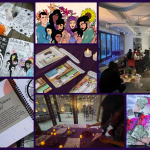I recently returned from a trip to former Yugoslavia, where my organization, FAIR Fund–a Grantee Partner of The Women’s Foundation–leads a program designed to help sexually exploited, homeless, and trafficked girls find safety and meet basic needs like housing or legal documentation.
These 20 girls, and more than 200 like them in Serbia, Kosovo, and Bosnia, have mainly been living on the streets. At ages as young as 11, many of these girls have been sold into a life of prostitution and are often forced to use drugs by dangerous pimps. These are not hidden girls and often the pimps are well known by local law enforcement. I have seen people just walk right past these children and look the other way. They are begging for food, they are standing dirty on street corners, they are being kept in abandoned buildings that are just blocks away from major centers of business and neighborhoods.
I have many times asked myself and others, including governmental representatives, one question that I have yet to find the answer: How can you walk past these girls? If you know they are there, why won’t you reach your hand out?
In a country where leading MSNBC reporters will casually use phrases like “pimp out,” or where top selling rap artists name their songs P.I.M.P., we are also turning our backs on some of the most vulnerable youth of today’s society.
So, I can’t judge without also acknowledging that right here in Washington, D.C., we are also walking right past girls and boys who are in desperate need of assistance. In D.C. alone, law enforcement identify sometimes as many as 26 girls monthly who have been exploited through commercial sexual exploitation.
Many of these girls, just like their young counterparts across the world in places like Serbia and Kosovo, are being controlled and abused by pimps. Here in D.C., someone looking to purchase sex from a child need to look no further than Craigslist and the ads are right there on their erotica section. Or, drive through the downtown area of Washington, D.C. late at night and you will see those girls.
Here are three simple things you can do to help right here in D.C.:
- Don’t look the other way. If you see a young person who looks like they may need help, you can call the Washington D.C. Police Department and speak to the Youth Division or call 911.
- Be conscious of language. If you hear someone casually using the word pimp, take five minutes to explain to them that pimps are not cool, that they are abusive and controlling people who exploit those more vulnerable–often girls as young as 11.
- Get involved. Volunteer with youth groups to mentor or speak with youth at risk of exploitation. Many of the girls we work with from places as far away as Bosnia to right here in D.C. really just need someone to listen to them and sometimes explain to them how to keep themselves safe.
Andrea Powell is the executive director and co-founder of FAIR Fund, a 2007 Leadership Awardee of The Women’s Foundation.



